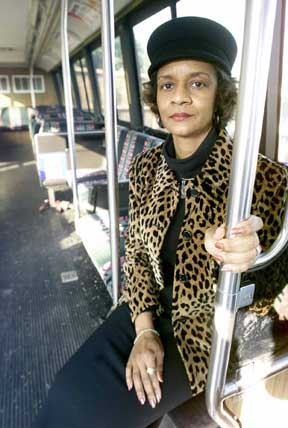
|

|
The Bus RideBy: Stephanie Allmon, Waco Tribune-Herald |
|
But she knew it didn't have to be that way. She wasn't sure of the details of the Civil Rights amendment, but she knew that black people no longer had to sit in the back of buses. So she paid her fare and sat down on the first seat, behind the white bus driver. That's when the threats started. "I knew he was mad as all get out," she said. "He was furious, absolutely furious." The bus driver leaned back and whispered, "Move to the back, nigger," Lockridge said. No one else could hear him, so he repeated it over and over. Lockridge didn't move. She stared straight ahead, out the window, for the rest of the 20-minute ride. "The incident is kind of like in a fog, but I remember very, very definitely being called a nigger," she said. "I wasn't afraid of him because it was a bus driver, and there were other people on there, not that anyone would have defended me. I don't remember feeling like I'd done anything wrong because I felt like it was my right, like, 'you can't make me sit someplace else.' '' When the bus pulled into Lockridge's stop, the infuriated bus driver wouldn't open the front doors. He made her walk to the back to exit. |
When she got home, she told her family about her ride. "I had a cousin who was really close to me, and I told her what had happened. Later on, we did it again," she said. She and her cousin boarded the same bus, had the same bus driver, sat in the same seat and got the same treatment. "We thought there was strength in numbers," she said. "That was a right we had. I didn't even remember thinking, 'I shouldn't sit here.' I knew it was OK." Lockridge entered Baylor University as one of a few black students in 1966, and the only black person in her major, home economics. She said that even though she had attended segregated schools and had never had any close white friends, she made friends with other white students, one of whom is still a dear friend. Lockridge got her master's degree and doctorate from Texas A&M University and is now director of the career and technology program in the Corsicana school district. She lives in Waco on the weekends with her husband, Vernon. They have two grown daughters. Lockridge doesn't harbor any bitterness toward that bus driver because he was "a product of his time," she said. She didn't intend to make a statement by sitting on the front seat of the bus, she said; it was simply an action that helped her claim her own dignity as a person. |
|
Return to Moments in Time home page |
|
Desegration Articles in Adobe PDF format |
 Jewel Lockridge was a young teenager,
admittedly a little stubborn and
rebellious, when she took the most
memorable bus ride of her life. One
day in the mid-1960s, she boarded
a Waco city bus alone in her neighborhood
near 17th Street and Wood Avenue.
She wanted to go downtown to shop.
As she looked down the aisles of
passengers, she saw a few white faces
toward the front and black faces
toward the back.
Jewel Lockridge was a young teenager,
admittedly a little stubborn and
rebellious, when she took the most
memorable bus ride of her life. One
day in the mid-1960s, she boarded
a Waco city bus alone in her neighborhood
near 17th Street and Wood Avenue.
She wanted to go downtown to shop.
As she looked down the aisles of
passengers, she saw a few white faces
toward the front and black faces
toward the back.